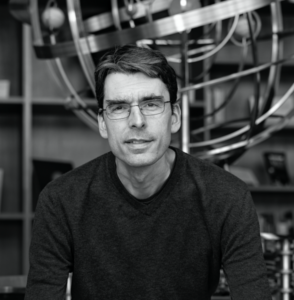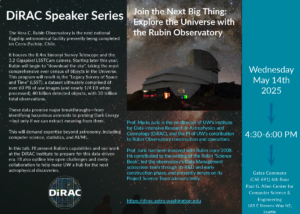Join the Next Big Thing:
Explore the Universe with the Rubin Observatory
Register here!

Speaker: Prof. Mario Jurić
Prof. Mario Juric is the co-director of UW’s Institute for Data-intensive Research in Astrophysics and Cosmology (DiRAC), and the PI of UW’s contribution to Rubin Observatory construction and operations. Prof. Juric has been involved with Rubin since 2008. He contributed to the writing of the Rubin “Science Book”, led the observatory’s Data Management subsystem team through its R&D and early construction phase, and presently serves on its Project Science Team advisory body.
Discover how the Rubin Observatory will “download the sky” with LSST, enabling data-driven astronomy and calling for broad collaboration.
The Vera C. Rubin Observatory is the next national flagship astronomical facility presently being completed on Cerro Pachón, Chile. It houses the 8.4m Simonyi Survey Telescope and the 3.2 Gigapixel LSSTCam camera. Starting later this year, Rubin will begin to “download the sky”, taking the most comprehensive ever census of objects in the Universe. This program will result in the “Legacy Survey of Space and Time” (LSST), a dataset ultimately comprised of over 60 PB of raw images (and nearly 1/4 EB when processed), 40 billion detected objects, with 30 trillion total observations.
These data are expected to dramatically advance astronomy: from discovering possible “killer asteroids”, a 9th large planet in the Solar System, to understanding the nature of Dark Energy. But its promise hinges on our ability to extract the knowledge from the data. It will require not only classical astrophysical know-how, but also significant contributions from numerous other areas: computer science, statistics, data science, as well as applications of ML/AI, to name a few.
In this talk, I will describe this new observatory, its capabilities, and potential for discoveries. I will then discuss the work done so far at Astronomy’s DiRAC Institute to prepare us for turning the deluge of data from Rubin into scientific insights. Most importantly, I will highlight various open research challenges that go beyond astronomy, and invite us all to join forces and make UW the source of the next wave of discoveries in astrophysics.
Prof Juric’s talk will be followed by a panel discussion and Q&A session on presently planned projects, potential “big ideas” for science with Rubin, and ways to join this work.
